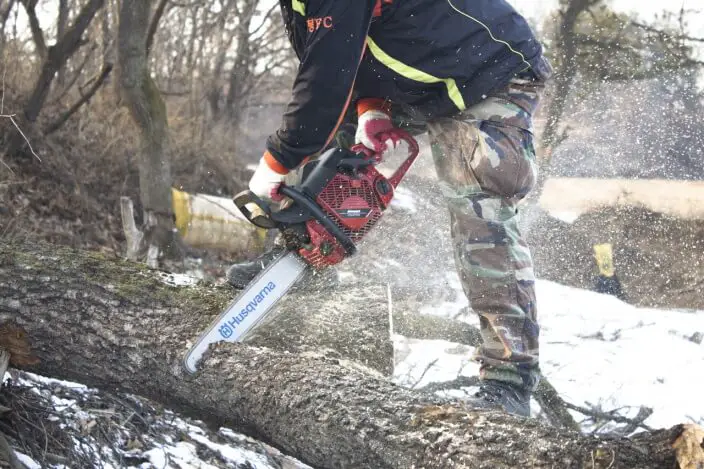When you’re planning a tree-cutting task, the weather isn’t always on your side. The weather may change in the blink of an eye, causing all of your plans to be ruined. But does this imply that the work will be stopped in the middle of the job being canceled entirely? That is something I seriously doubt.
As a result, a related question arises:
Is it possible to operate a chainsaw in the rain?

The chainsaw has traditionally been regarded as a piece of strong and long-lasting power equipment. This is due to the fact that they are commonly utilized in a variety of weather situations, including rain, as well as varied settings, such as woods and marshes. When you contemplate a chainsaw’s flexibility as a power tool, you may assume that it’s waterproof and can be used to cut down wood that is wet or has fallen into a body of water.
Your chainsaw will not be damaged by the rain, and you may continue working on your job as normal. Simply make certain that the engine is not immersed in water.
Therefore, it is highly recommended that you never use your electric chainsaw, especially the corded one, when wet. Even with a cordless electric chainsaw, it is always wise not to use it when wet. Aside from the risk of rusted blades, a wet electric chainsaw can be generally ineffective.
Is It Bad to Use a Chainsaw on Wet Wood?
One question that continues coming up for folks who live in a temperate region with plenty of rain throughout the year is whether it’s “Can you use a chainsaw to cut damp wood?” There is no disputing that power tools and water are a source of anxiety for many people. However, not all tools are created equal. And some people are more than capable of surviving in rainy situations. For individuals who are short on time, the simple response is a loud yes. Yes, you can cut damp wood with a chainsaw.
Cutting the damp wood with your chainsaw isn’t too bad. Dewdrops, showers, or snow will not harm your chainsaw on the wood. Because the increased moisture on the wood acts as a natural lubricant, cutting through wet wood is considerably easier than cutting through dry wood.
On the other side, it generates less sawdust, which aids sight and control. However, damp sawdust may adhere to your blade, slowing its speed and necessitating more frequent blade cleaning.
Chainsaw blades are available in a wide range of forms and sizes. However, standard blades will suffice for cutting damp wood. You’ll see advertisements for wet-cutting blades, but you don’t have to buy them and waste money.
Is It Ok to Use a Battery-Powered Chainsaw in the Rain?
When it comes to rainy-day use, battery chainsaws are pretty comparable to corded chainsaws. I wouldn’t do that, even if it isn’t as risky because the battery is the only source of power.
If water gets inside, it might cause a short circuit in your saw, which would most likely kill your battery. This is an unnecessary expense that may be avoided.
In conclusion, I would not use battery chainsaws in the rain.
Is a Chainsaw Waterproof?
Although chainsaws are not waterproof, they are designed to withstand wetness and wet operating circumstances. They can work in the snow and rain without putting the operator or the chainsaw motor at risk. A plastic body cover protects the chainsaw’s water-sensitive components from direct contact with water.
In rainy weather, chainsaws pose a risk:
Petroleum: no health risks, excellent humidity resistance.
Battery: There is no danger to the operator, but if the battery is exposed to water, it may oxidize.
Electric chainsaws for home usage are extremely harmful to the operator’s health and should never be used in heavy rain.
So, if it’s pouring outdoors, always use a gasoline chainsaw. They are capable of overcoming any obstacle. Of course, because they are not waterproof, this does not imply that you may use them underwater.
How Do You Clean a Chainsaw After You’ve Used It in the Rain?
Moisture and even rain are no match for a chainsaw. The chain and bar of a chainsaw, like other metals, are subject to rust while the chainsaw is operating in the rain or cutting damp wood. If a chainsaw is not thoroughly cleaned every time it gets wet; rust will begin to form on the bar and chain, causing premature wear of these critical chainsaw components. The following procedure can be used to clean a wet chainsaw.
Dry the Chain and Bar
Using a cloth, dry the whole chainsaw, particularly the chain and bar, and check for grit and other particles lodged inside the chain.
Lubricate the Chain and Bar
Once the chainsaw blade and bar have been dried, the next step is to protect them against rust. Coating the chain and bar with a thin coating of oil is the best method to protect them from rusting, and all chainsaws have a built-in lubrication reservoir. Simply fill the oil reservoir with clean lubricant and run the chainsaw to lubricate the chain and bar thoroughly.
If you get water inside your chainsaw by mistake, make sure to dry it well before using it again. If water sneaks into a gas chainsaw’s fuel tank, take care to completely empty it and refill it with new gasoline.
Can a Chainsaw Get Damaged if Used in the Rain?
Yes, a chainsaw can get damaged if used in the rain. The moisture can seep into the electrical components and cause corrosion, which can damage the saw’s engine and electrical system. Additionally, the oil and gas mixture can become diluted, reducing the effectiveness of the lubrication and potentially causing damage to the engine. It is best to avoid using a chainsaw in wet conditions and to thoroughly dry it off if it does get wet.
Are There Any Precautions to Take When Using a Chainsaw in the Rain?
Yes, here are a few precautions to take when using a chainsaw in the rain:
- Avoid electrical hazards by ensuring the chainsaw is grounded and never use it near power lines.
- Keep the chainsaw dry by using a rain cover or waiting for the rain to stop.
- Check the chainsaw’s grip and the ground for slippery conditions.
- Use a good quality oil that’s suitable for wet conditions.
- Pay attention to your surroundings and be cautious of falling branches.
Conclusion
The chainsaw has traditionally been regarded as a piece of strong and long-lasting power equipment. It is highly recommended that you never use your chainsaw, especially the corded ones, when wet.
Some people are more than capable of surviving in rainy situations with a chainsaw. Chainsaw blades come in a variety of shapes and sizes, but standard blades will suffice for cutting damp wood. If water gets inside, it might cause a short circuit in your saw, which would most likely kill your battery.
Electric chainsaws for home usage are extremely harmful to the operator’s health. Moisture and rain are no match for a chainsaw; they are capable of dealing with any adversity. So, if it’s pouring outdoors, always use a gasoline chainsaw. Coating the chain and bar with a thin coating of oil is the best way to protect them from rusting.
About This Writer

Hi, I am Eric Devin and I am a professional interior architect. Since childhood, I've always enjoyed DIY projects! And, I have loved to solve simple household problems using essential tools and equipment. I have also acquired a lot of information about basic household tools settings by working with contractors.